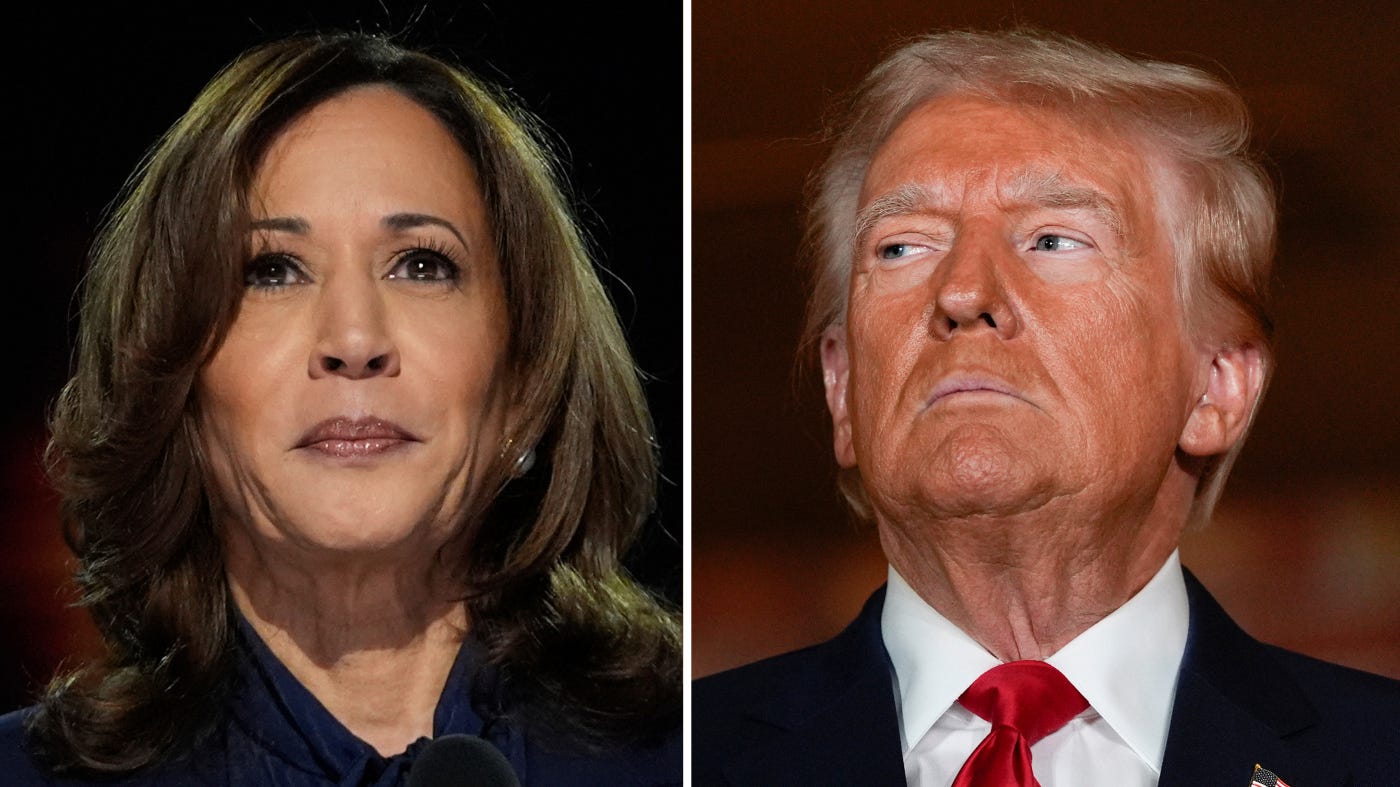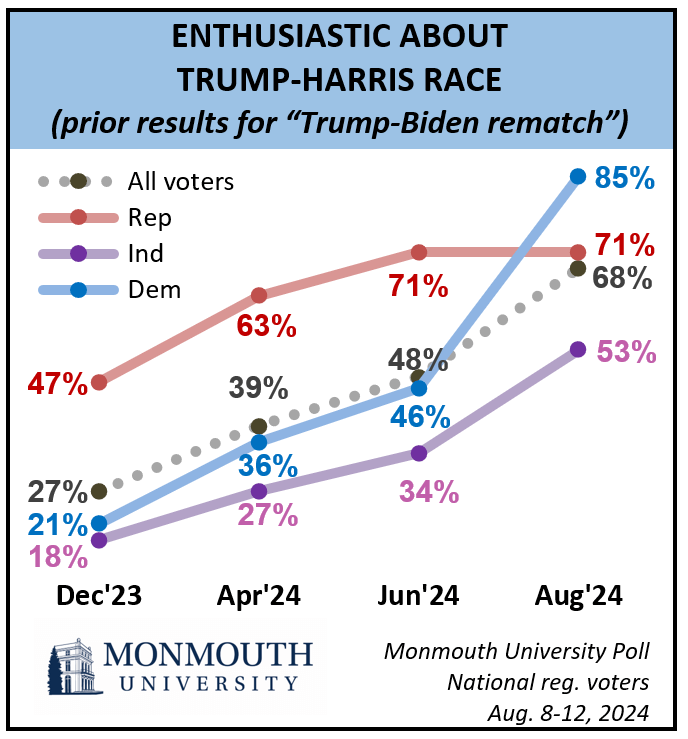The conventions are over.
We have presidential nominees. And vice presidential nominees.
In moments like this one, a bit of a calm before the (next) storm, I think it’s helpful to take a step back from the clutter and detritus created by the 2024 campaign and ask a simple question: So where are we now?
Or to put that in a slightly more expansive way: What do we know — or think we know — about the race and where it’s headed?
To that end, I’ve put my 6 big-ish thoughts about the race below. And, I would note, there is still plenty we don’t know. Like will Harris get a convention bounce (and how big)? Or will the candidates actually debate on September 10 or not?
How those questions get answered will impact the race. We just don’t know how yet!
This post, with my best sense of where things stand today, is free. But in order to keep doing this sort of independent journalism, I need your financial support. If you become a paid subscriber — it’s $6 a month or $60 for the year — you help me in my goal of making journalism my forever career. (And you get lots of perks too!)
1. Kamala Harris has united and excited the Democratic base…
When Joe Biden was the Democratic nominee, it was clear that key elements of his party base — especially young people and black voters — did NOT want him to represent them and were decidedly unenthusiastic about voting for him.
The switch to Kamala Harris changed that almost overnight. (Which is remarkable in and of itself.)
This chart — via Monmouth University — is absolutely stunning:
And this one — via Pew — tells that same story in another way:
That rapid consolidation of the Democratic base is, largely, responsible for Harris’ surge in the polls. Which is a sine qua non of her winning this election. (No candidate, in either party, wins without the close-to-unanimous support of their party base.)
But, your base alone won’t win the election. Which brings me to…
2. …But the race is still very close
The elation of Democrats at the Harris-for-Biden swap was evident in Chicago last week. The party was SO down after the June 27 debate — and the resultant 3 weeks of will-he-or-won’t-he-drop-out talk — that many strategists I talked to during that time seemed almost resigned to a Trump victory.
Harris has breathed massive new energy into the party. Democrats are excited again. They feel optimistic.
And they should! They were dead in the water six weeks ago. Now they are very much in the mix.
But, what seems clear to me is that some Democrats at least are a little over-exuberant. (This is not true, by the way, of the Harris campaign.) Like, yes, Harris has surged. And she may well get an even bigger bounce post-convention. (We don’t have enough post-convention polling yet to say for sure.)
Even if she does, however, I think this election is going to be very close.
The Washington Post’s polling averages in the 7 swing states is a useful window into what’s actually going on:
What does this show? Clear movement — in every state — toward Harris. And yet, in four of the seven swing states, Trump still leads.
This is what the electoral map would look like if the candidate currently leading in each of the swing states actually won those states:
So, Harris would win — by an incredibly narrow margin. Not a lot of wiggle room!
My strong sense is that we are headed to a very close electoral college vote ala 2000 or 2004. In the former, George W. Bush won with 271 electoral votes. In the latter, he won with 286.
3. Trump is the weakest GOP candidate possible
Close your eyes and imagine this scenario on Earth 2: Trump doesn’t run for the 2024 nomination. And Nikki Haley winds up as the GOP nominee. (Like I said, this would only happen on Earth 2!)
Does anyone — even the most partisan Democrat out there — think that Haley wouldn’t be ahead of Harris right now?
I am utterly convinced that ANY of the major GOP candidate — yes, even old Pudding Fingers — would in fact be leading Harris right now if they were the nominee.
Why? Because all of the fundamentals of the election favor the GOP:
The incumbent is unpopular
His vice president is the Democratic nominee
Two thirds of the country believe we are off on the wrong track
On the two issues that voters care most about — the economy and immigration — they say they trust Republicans more than Democrats to handle them effectively
Given that, a generic Republican should beat a generic Democrat for president. Trump, of course, is the opposite of a generic Republican. His personality is a massive turnoff for lots and lots of voters who should be for him on the issues alone.
The best thing Trump could do is, well, stop talking. The more he talks, the more he reminds people of all the things they don’t like about him. And the harder it becomes for them to separate the issues, where they want to vote for a Republican, and Trump’s noxious personality.
4. Harris is (still) hiding from the press
Kamala Harris is now, formally, the Democratic nominee for president. She has been the de facto nominee almost since the moment that Biden dropped out of the race on July 21.
That was 36 days ago. Since that day, Harris has sat for a total of ZERO media interviews. She has held ZERO press conferences. And, by my rough estimate, she has taken less than 15 total questions from reporters — in any format — over that time.
Look. I get why she is doing it. Her polls are surging. She’s getting GREAT press coverage. (More on that below.) Why should she do an interview with the media if she doesn’t have to? (I wrote about why here. And here.)
The fact is that Harris is running to be the single most powerful person in the world. We have very little sense of what she believes and what she would do if she is elected.
In fact, all we really know is that Harris has walked away from virtually every policy position she staked out when she ran for president in 2020 — from a ban on fracking to support for Medicare for All to backing mandatory buy backs of assault weapons.
I am TOTALLY in favor of politicians’ evolving in how they think about issues — and changing their positions as a result. But Harris hasn’t explained why she changed positions. She has’t explained much of anything.
I think that, given the import of the office she is seeking, Harris face serious questions from independent media about her evolution on policy positions. Period.
5. Trump has a *very* hard vote ceiling
Six weeks ago, Donald Trump was winning the 2024 election. Here’s what the Real Clear Politics polling average looked like between Trump and Joe Biden:
Today, Trump is losing the presidential race. Here’s what the Real Clear Politics polling average looks like between Trump and Harris:
Notice any similarities between those two charts?
Look at the Trump number. When was on top of the world on July 21, he was getting 47.9% of the vote against Biden. When he is at low ebb — or close to it — right now against Harris (post Democratic convention etc.) he is at 46.9%.
One point different!
The reality driven home here? That Trump has both a high floor and a very hard ceiling in terms of vote share. Even as Biden was collapsing politically, Trump never broke 48% in the national polling average. And even as Harris has enjoyed one of the best month-long runs in recent political history, Trump hasn’t fallen much below 47%.
That’s truly incredible.
It’s also remarkably consistent with how Trump has performed in his two presidential bids. In 2020, Trump got 46.9% of the national popular vote. In 2016, he got 45.9%.
Trump’s floor appears slightly higher this time around. But his ceiling is equally low. He simply cannot get above 48% of the voting public to be for him. That would worry me if I was his campaign.
6. Harris has received amazingly positive press
Despite the fact that she has barely interacted with the media since emerging as the Democratic presidential nominee, the press coverage of Harris has been almost exclusively laudatory.
It has focused heavily on how excited the Democratic base is about her. How much money she has raised (admittedly it is a HUGE sum). On the historic nature of her candidacy. On how Trump can’t seem to find a good way to attack her.
It’s been VERY noticeable.
While I take everything the Media Research Center produces — it’s an extremely anti-media outlet — with a grain of salt, this chart is telling (even if it comes close to approximating the tenor of the coverage of the two candidates):
Having spent two decades in mainstream media, here’s what I think is going to happen: The media is very aware of its critics. And reactive to them.
Which means that they know the narrative out there right now is that the press has been over-the-top positive about Harris. And that they are likely to react to that narrative by working to show their independence — by digging into some of the less appealing Harris stories (past staff complaints, lack of policy detail, unwillingness to engage with the media) in the coming weeks.
That more critical — Democrats will say negative — turn to the Harris coverage is coming. I am not sure exactly when. But soon.












I simply do not understand why Harris should sit for an interview until she has to. If she was guaranteed a win with zero interviews, I would hope she sat for zero interviews. Only one candidate is an existential threat to the country. That said, you do everything in your power to ensure they do not get elected. If that means no interviews, who cares. We can worry about what the candidates "owe" the process when Trump is but a distant memory.
Well, regarding trump’s coverage being 89% negative—it may have to do with the fact that trump is a negative guy. A bully, sophomoric sexual assaulter and convicted felon. Hard to spin that into a positive portrait.